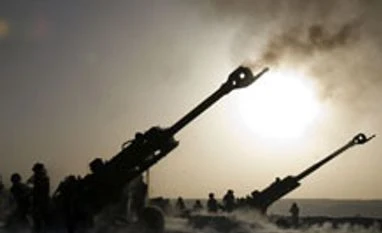Amid voices in the government that the Indian Army's precision strike against insurgents inside neighbouring Myanmar was a lesson to those who incite terror, former top army officials have said sending troops into Pakistan in hot pursuit of militants can escalate into war.
Former army chief Gen. (retd) V.P. Malik said the situation was different on the western border.
Talking to host Karan Thapar during a programme on India Today television channel, Gen. Malik said surgical strikes do not take place on the western border but there is artillery bombardment.
Another former army chief Gen. (retd) N.C. Vij, who was also present during the programme, said that while the army did a commendable job in its response to the militant attack, there were lessons to be learnt as far as the strike was concerned.
Answering a query, Gen. Malik said India cannot send troops into Pakistan as the issue will escalate.
"Moreover, one needs to bear in mind that Pakistan is an enemy nation whereas Myanmar is not. Sending troops there (Pakistan) will escalate the problem and blow into a full-fledged war. The manner of response is different when it comes to Pakistan," he said.
More From This Section
Asked about Pakistan possessing nuclear weapons, Gen. Malik said "the nuclear state aspect is a little overblown".
"First and foremost, Pakistan will not use its nuclear weapons as they would be the first to be affected by it as radiation does not remain limited. Nuclear weapons are meant to prevent wars and not win them.
"Pakistan is well aware of the consequences of using a nuclear weapon. Moreover, do you think they are going to target New Delhi? The diplomatic community of the entire world is in New Delhi and if they are targeted, you can well imagine what would happen to Pakistan," Gen. Malik said.
He said if Pakistan's nuclear weapons go into the wrong hands, it was the West that will be targeted.
He said there were three-four very significant points in the army operation along the Myanmar border.
Gen. Malik said there was very good coordination between the intelligence agencies, and the army was able to get actionable intelligence from all sources.
"Second, I would say very good decision-making. Operations of this nature on the border... slightly across the border would require political permission also so the whole decision making has gone (about) very fast and apparently there is no hesitation on the part of the political authority to give this permission.
"Third, I would say as far as the operation is concerned, the air force would be involved also, the helicopters would have been involved in this, so that is another good coordination point."
Gen. Vij also said the army carried out a commendable job on the Myanmar border but it was caught completely off-guard by the militants during their strike on June 4.
"They were caught off-guard in areas extremely prone to attacks by militants. There was intelligence failure and they had let their guard down.
"The hot pursuit that was conducted along the border of Myanmar is no doubt a rendition of honour, but there are several lessons that need to be learnt as well," Gen. Vij said.
About the role of the Myanmar government and the army, Gen. Vij said: "I believe the operation could not have been possible without the help and coordination of the Myanmar government and the army. Without informing them, things could have gone wrong.
"Miscommunication could have led to casualties on our side too," he said.
He said the troops who conducted the operation were commandos specially trained for such tasks and having the latest equipment.
"Militants hiding along the Myanmar border is not a new problem. We have seen this happening since the past 20 years and the Indian Army has been involved in similar operations over there for long."
Asked about statements that the operation along the Myanmar border was also a kind of message to Pakistan, he said one should think before issuing statements on army operations.
)